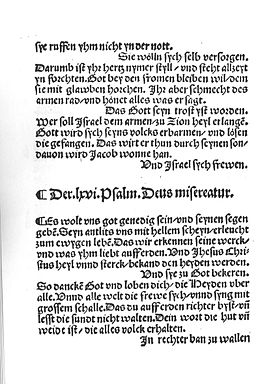Es woll uns Gott genädig sein
| "Es woll uns Gott genädig sein" | |
|---|---|
| Hymn by Martin Luther | |

"Es wolt uns got genedig seyn" in the Erfurt Enchiridion, 1524
|
|
| English | May God be gracious to us |
| Text | by Martin Luther |
| Language | German |
| Based on | Psalm 67 |
| Melody | by Matthias Greitter |
| Published | 1524 |
"Es woll uns Gott genädig sein" (May God be gracious to us, or more literally: May God want to be merciful to us) is a Lutheran hymn, with words written by Martin Luther based on the Psalm 67. The hymn in three stanzas of nine lines each was first published in Wittenberg in 1524. The hymn, with a tune by Matthias Greitter, was set to music by composers including Heinrich Schütz and Johann Sebastian Bach. It was translated to English and has appeared in 25 hymnals.
Luther wrote in a letter to Georg Spalatin, around the end of 1523, about the importance of writing "Deutsche Psalmen" (German psalms). Trying to win Spalatin for collaboration, he specifies:
"Neue und modische Wörter sähe ich gern vermieden; denn um die Gemeinde zu gewinnen, muss man ganz schlichte und volkstümliche, doch zugleich saubere und geeignete Wörter wählen, und der Sinn soll klar und möglichst psalmnah wiedergegeben sein. Deshalb muss man frei verfahren und den angenommenen Sinn ohne Rücksicht auf den Wortlaut durch geeignete Worte übertragen."
(I would like to see new and fashionable words avoided; for in order to win the congregation, one has to choose quite simple and popular words, but at the same time clean and suitable ones, and the meaning should be rendered clearly and as closely to the psalm as possible. Therefore one has to proceed freely and transfer the assumed meaning without regard to exact text by suitable words.)
Luther wrote "Es woll uns Gott genädig sein" as a paraphrase of in three stanzas of nine lines each. It was first printed in Wittenberg in 1524, first in a leaflet together with "Aus tiefer Not schrei ich zu dir”, a paraphrase of Psalm 130. It appeared then in Luther’s Ein weyse Christliche Messe zu halten und zum Tisch Gottis zu gehen (A way to hold a Christian mass and to go to the table of God). It was published the same year in the Erfurt Enchiridion.
...
Wikipedia
